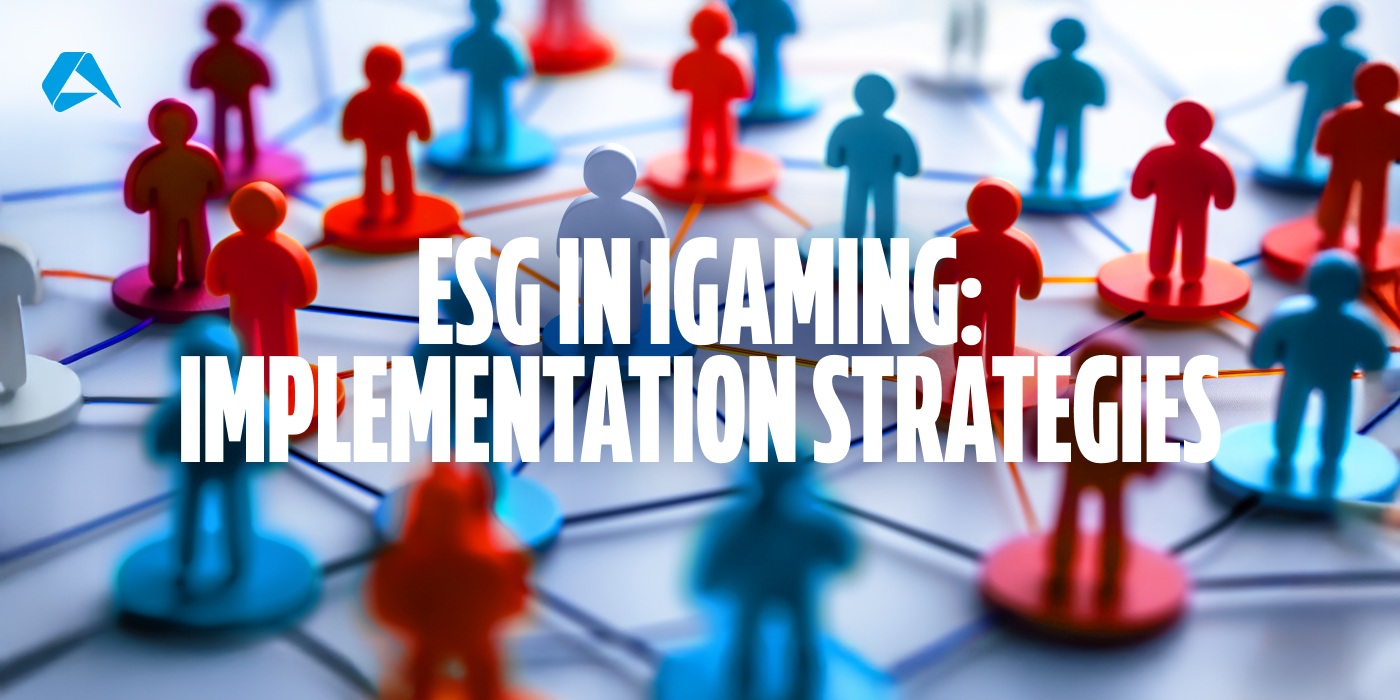Overview ESG Strategy: The Commercial Edge in iGaming Compliance
ESG (Environmental, Social, and Governance) is rapidly becoming the commercial edge and licence to operate in the iGaming sector. Operators who overlook this fundamental business factor risk delays and higher costs, potentially being sidelined by key stakeholders, including banks and partners.
Regulators are raising expectations, moving beyond baseline compliance to assess operational maturity through factors like social responsibility, player protection tools, and environmental policies.
The three core risks for digital iGaming are Social Responsibility (the most immediate exposure concerning problem gambling and fines), Environmental Exposure (data centre energy use and carbon footprint disclosure), and Governance (covering AML, data protection, and ownership transparency).
Implementing strong ESG strategies generates practical cost savings and resilience. Operators can reduce operational costs by choosing renewable cloud providers, securing better insurance terms, and strengthening banking relationships to potentially avoid higher transaction fees. ESG ensures the business runs leaner and builds credibility, which is essential for attracting investors and partners.
Discover the 15 practical ways ESG can cut costs, boost efficiency, and future-proof your iGaming business — read the full blog for exclusive insights
Think ESG doesn’t apply to online betting? Then you’re not alone. But behind the scenes, banks, regulators, and even your partners are starting to demand proof that you care about the environment, your people, and fair governance.
Here’s the part most operators overlook. It isn’t the headlines that matter. Without a clear ESG strategy in today's iGaming sector, operators risk delays, higher costs, or being quietly sidelined by regulators and partners.
In this article, we’re not going to tell you to ‘go green’ for the sake of it. We’re going to show how environmental, social, and governance strategies are emerging as one of the most practical commercial advantages in iGaming today and exactly where your business can apply ESG policies to stay ahead of the curve.
Why ESG Is Fast Becoming a Licence to Operate
For many operators, ESG may still feel like a branding choice, meaning a nice-to-have addition to annual reports or investor decks. But the reality is changing fast. Across major iGaming jurisdictions, environmental, social, and governance factors are starting to have a greater influence on who gets licensed, who secures payment partnerships, and who builds the credibility needed to operate without disruption.
Regulators are raising expectations. Licensing bodies are increasingly seeking evidence of social responsibility rather than merely compliance requirements. They’re asking questions about safer gambling tools, data protection practices, and even environmental policies where relevant. In a nutshell, ESG is becoming part of how suitability and operational maturity are assessed.
Further to this, banks and payment providers are tightening onboarding criteria. Financial partners are under pressure to de-risk their portfolios. This means greater scrutiny of the social and governance practices of operators, especially in regions where gambling faces political and social resistance. Ultimately, an unclear ESG profile can delay or block banking approvals entirely.
Meanwhile, sponsorships, media access, and market entry are also affected. Sports teams, leagues, and media outlets are under public pressure to associate only with brands that uphold high ethical standards. ESG performance, therefore, also shapes your ability to strike meaningful partnerships that build visibility and growth.
In short, ESG is no longer about optics. It’s becoming a fundamental business factor that decides whether your operation is seen as a strategic partner or a potential liability.
Practical Risks for iGaming Operators

Many operators assume ESG risks don’t apply to them because they’re digital businesses without factories, vehicles, or physical supply chains. However, in practice, ESG exposures run deep across three areas that directly impact licensing, compliance costs, and operations.
Social Responsibility: Player Protection and Social Impact.
Social risk is the most immediate ESG exposure in the iGaming industry. Problem gambling, underage betting, and insufficient responsible gambling tools can trigger fines, licence restrictions, or even public backlash. For operators expanding into new markets, social responsibility performance is often scrutinised during licensing, with failures in one jurisdiction raising red flags in others.
Environmental Exposure: Data Centres and Emissions Disclosures.
While betting itself is digital, the infrastructure behind it isn’t. Servers, cloud providers, and data centres consume significant energy, with major operators now expected to disclose their carbon footprint as part of broader corporate responsibility. Regulators and partners increasingly view environmental transparency as a sign of operational maturity, and a failure to manage it can raise questions about governance and long-term viability.
Governance: Gaps in Compliance, AML, and Operational Transparency.
Governance is where ESG risks become decisive for business continuity. Weak AML procedures, ambiguous ownership transparency, or poor data protection practices expose operators to penalties, licence suspensions, and reputational damage that undermines both player trust and B2B partnerships. Regulators want to see evidence of strong management frameworks that go beyond baseline compliance to demonstrate integrity and accountability.
Taken together, these risks aren’t theoretical. They shape how stakeholders assess your business, and ignoring them can become an operational liability far faster than many realise.
Turning ESG Into Cost Savings
When industry professionals hear the term ‘ESG’, many think of the associated costs. But what often goes unnoticed is that some of the most effective ESG policies can pay for themselves many times over.
Here are 15 practical ways that environmental, social, and governance (ESG) practices can help reduce costs and build commercial resilience in your iGaming business today:
1. Choosing renewable cloud providers
Switching to renewable-powered cloud services reduces energy costs and demonstrates environmental responsibility to partners and regulators.
2. Optimising server and data loads
Dynamic scaling and eliminating redundant processes lower hosting bills while improving platform efficiency and user experience.
3. Reducing office footprints through hybrid work
Fewer desks, smaller spaces, and reduced utilities cut operational overheads while supporting employee wellbeing and flexibility.
4. Improving employee retention through strong social policies
Strong social policies reduce staff turnover, cutting recruitment, onboarding, and productivity loss costs for your business.
5. Minimising regulatory fines through proactive compliance
Strong governance reduces compliance failures, avoiding fines, legal fees, and costly licence review processes or suspensions.
6. Securing better insurance terms with risk transparency
Insurers favour companies with clear ESG and governance policies, often offering reduced premiums for lower operational risks.
7. Partnering with efficient, ESG-focused suppliers
Ethical, efficient service providers often have lower risk premiums and better operational pricing structures for SMEs.
8. Streamlining governance for faster decisions
Clear policies and responsibilities reduce wasted time on approvals, internal disputes, and compliance clarifications.
9. Strengthening banking relationships to avoid higher fees
Banks view strong ESG governance as lower risk, reducing onboarding issues and potentially lowering transaction fee structures.
10. Attracting investors with ESG commitments
Investors favour ESG-ready companies, improving access to capital with better terms and lower risk premiums.
11. Reducing marketing spend through brand trust
Ethical brands enjoy stronger organic acquisition and loyalty, reducing reliance on expensive paid marketing campaigns.
12. Saving on utilities with basic office efficiencies
Switching to LED lighting, efficient appliances, and smarter cooling and heating systems can cut monthly bills with minimal upfront investment.
13. Lowering dispute resolution and legal costs
Clear governance and responsible marketing policies reduce player disputes, complaints, and potential legal costs.
14. Avoiding the costs of negative media
Strong player protection and social responsibility reduce the risk of negative media coverage and political intervention.
15. Benefiting from tax credits for green initiatives
Some jurisdictions offer tax reductions for certified environmental actions, such as the use of renewable energy or carbon reporting.
Preparing for the Future
For many, particularly SMEs, ESG may seem like tomorrow’s problem, but signs of its impact are already evident for iGaming operators.
To begin with, licensing processes are undergoing significant evolution. In several European markets, such as the UK, the Netherlands, Denmark and Sweden, regulators are expanding suitability checks beyond financial stability and compliance history. They’re asking how operators protect players, manage data responsibly, and ensure ethical governance at the board level. These are ESG assessments in everything but name, and they’re becoming a standard part of licence renewals and new applications.
In response, several major operators are already raising the bar. Groups like Flutter and Betsson are publishing annual ESG reports that detail their energy use, social impact, and governance frameworks. While SMEs may not require the same level of reporting depth, these disclosures establish new expectations across the sector, influencing the threshold demands of regulators, partners, and investors for all.
Preparing for the future doesn’t mean overhauling your business overnight, but it does mean recognising that ESG is no longer theoretical. It’s here, shaping who gets licensed, who gets paid, and who earns trust in an increasingly scrutinised market.
Actions You Can Implement Today
Implementing ESG doesn’t have to mean sweeping changes or costly programmes. Starting today, small, targeted actions can build compliance credibility, operational efficiency, and commercial strength.
ESG Actions & Commercial Value
| ESG Action | Quick Win | Long-Term Business Value |
|---|---|---|
| Switch to renewable cloud hosting | Adjust provider preferences this week | Lower operational costs, enhanced licensing credibility with environmental transparency |
| Optimise server loads and data processes | Review platform infrastructure for efficiency gains | Reduced hosting bills, faster platform performance, and lower energy use |
| Strengthen RG tools and staff training | Update player limits and intervention scripts now | Reduced risk of fines, faster licensing approvals, improved player trust and retention |
| Review and enhance AML frameworks | Conduct an internal compliance audit | Avoid penalties, protect banking relationships, and strengthen market entry suitability |
| Publish existing RG and governance policies | Add disclosures to your website today | Demonstrates transparency to regulators, partners, and investors |
| Conduct a governance review | Clarify compliance roles and escalation procedures | Faster decisions, reduced operational risk, improved regulator confidence |
Why These Actions Matter
Each action above delivers more than ESG compliance. They help to:
-
Reduce operational costs and risks.
-
Build credibility with regulators and banks.
-
Strengthen brand trust with players and partners.
Strengthening Your Business Through ESG
If there’s one takeaway that should be remembered from this article, it’s this. ESG policies aren’t just there for external approval. Fundamentally, they’re decisions that shape how resilient, efficient, and credible your business truly is. From the cloud providers you choose to the governance frameworks guiding your operations, ESG influences the hidden processes that keep your platform running smoothly and competitively.
Operators who embed ESG into daily decisions typically find themselves running leaner, making faster compliance approvals, and attracting partners who value stability and responsibility.
In a market where reputation travels faster than any campaign and where regulatory expectations keep tightening, these are advantages that money alone can’t secure. They’re built through intention, credibility, and small decisions taken consistently before they become urgent requirements.
A strong ESG approach starts with the right systems. Schedule a product demonstration with Altenar today and discover how our technology ensures your business remains compliant, transparent, and competitive from day one.













